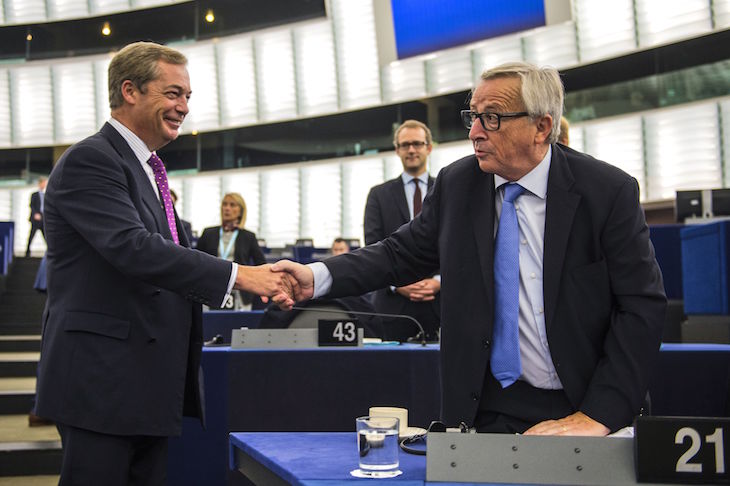Let me make it clear at the outset: I was against Brexit. However, I am appalled by the reaction to the referendum of the Europhiles in Brussels and elsewhere in the EU. Instead of taking the right lesson from Brexit, Commission President Jean-Claude Juncker and French President Emmanuel Macron used it to promote their project of a United States of Europe.
The European Parliament’s Brexit spokesman Guy Verhofstadt displayed an unacceptable arrogance towards the British voters during the recent Brexit debate in Strasbourg and EU chief negotiator Michel Barnier continues to give the impression that he is out to punish them. Instead of developing a timetable for the negotiations together with the British, he forces his own down their throat. He demands that Britain should name the price for their exit ticket before they even know what they will get for it.
That makes as little sense as his insistence that Britain present a solution for the Irish border before negotiating the details of the future trade relationship. How is it possible to conclude a border regime without an agreement on the customs treaty? Furthermore, both Britain and the EU seem to have overlooked that the many trade deals the EU has with closed other regions – also on behalf of the UK – do not allow an EU border with a gaping hole. Neither has Theresa May’s recent dinner with Juncker, nor the meeting with Angela Merkel, changed anything: the EU insists on Barnier’s timetable, which amounts to nothing but blackmail.
It is high time for politicians in both Britain and the EU to inspect the mess they have created. Meanwhile, it has become clear that Brexit will be highly detrimental to citizens and companies in Britain and the EU. As a first step to get out of this situation both sides need to admit their mistakes.
Firstly, it was Brussels which changed the rules of the game, not Britain! It’s like Britain joined a football club and the club management decided to play golf instead. It was Brussels, Berlin and Paris which violated the principles of subsidiarity, self-responsibility and competitiveness laid down in the Lisbon treaty, not Britain. This helped create the base for the British referendum in the first place. Ukip was a result of the ever-increasing centralisation, arrogance and bureaucracy of the Europhiles. Nigel Farage’s stage to political fame in Britain was not Westminster but Strasbourg. No wonder prime minister David Cameron felt obliged to schedule the referendum. And it was Brussels – with the help of Chancellor Merkel – which helped swing the result narrowly towards Brexit by their refusal to offer some flexibility to let Britain control its borders.
In Britain, on the other hand, the advocates for Brexit failed to communicate the true impact Brexit would have on the economy. They grossly over-interpreted its advantages and underrepresented its draw backs. Those who campaigned for Remain failed to spell out the advantages of being a part of the EU, the common market, the trade deals with other regions or the common research programmes.
Meanwhile, the ongoing negotiations clearly show that both parties not only underestimated the complexity of Brexit but that they have still no clue how to make it work. In particular, it has become obvious that the development of a plan to keep the border open between Ireland and Northern Ireland is impossible without knowing the details of a trade or customs regime. It is therefore now up to Brussels to stop two high-speed trains running towards each other on the same track and agree to open the negotiations on the future trade deal with Britain.
Hans-Olaf Henkel is an MEP for Germany and a vice-chair of the European Conservatives and Reformists Group.






Comments